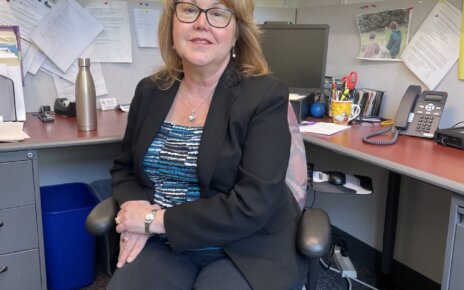Claude E. Taylor, Director for Academic Transition and Inclusion in the Center for Student Success, moderated a virtual community discussion titled “African American Political Participation and the Legacy of Shirley Chisholm” on Thursday. Feb. 25.
The evening’s dialogue was built around and shaped by the film “Chisholm ‘72: Unbought & Unbossed,” a 2004 documentary by filmmaker Shola Lynch that chronicled Chisholm’s rise as the first woman to run for the Democratic Party’s presidential nomination and the first African American candidate to run for any major party’s presidential nomination.
Taylor set the stage for the night’s discussion by reading a passage written by Lynch, the film’s creator.
“I got to know Shirley Chisholm through the making of ‘Chisholm ‘72: Unbought and Unbossed’,” Lynch wrote. “What I discovered is that Chisholm was not a great woman. She was an ordinary woman who exercised the extraordinary in her by taking great risks. She started her professional life as a school teacher who volunteered at the local Democratic Club and evolved through the years into a politician. She saw things in her community that she wanted addressed. Instead of complaining, she tried to do something about it. That attitude took her on many journeys throughout her life, including a run for the Democratic nomination for president.”
“What I love about the film is that it’s about an ordinary person actively participating to shape the Democracy we live in,” Taylor Said.
Taylor shared a quote from Chisholm that he believes “captures the essence of this figure in the United States political landscape.” She said she wanted to be known as a 20th century black woman who dared to be herself.
“That’s a deeply profound self-awareness that speaks to her engagement in the public sphere as a historic political figure that we’ve come to know,” Taylor said.
The parallels between Chisholm’s 1972 election campaign and recent political presidential campaigns is notable, Taylor said. He then encouraged the audience to share their own interpretations and thoughts on the film.
Sharon Mitchell, an organizer from the Plainsboro Public Library, shared her thoughts on Chisholm’s presidential run and the similarities to candidates today. She noted that issues such as voting rights, voter suppression and education are still relevant in the modern sense.
Mitchell recalls a scene in the film where Chisholm’s probability of winning was considered low. To help the odds, those around her asked Chisholm to consider running as a Vice President instead.
“Here we are today with Kamala Harris, who identifies herself as African American,” Mitchell said. “Considering the parallels, I just find that whole thing interesting.”
Diana Rosenberg, an event attendee, drew parallels between Chisholm losing endorsements for president as a result of not being considered a “safe” choice and the modern Democrat party having a similar mindset.
“Bernie Sanders had this grassroots support, but right before the South Carolina primary [most of the candidates] bailed,” Rosenberg said. “We had a large pool of candidates seeking the Democratic nomination for president, but they all bailed before the South Carolina primary to go with the candidate who had the ‘most realistic’ chance of beating Donald Trump. The more things change, the more they remain the same and that was just astounding to me.”
The genre of documentary film uses the ability to capture the sentiment and the feel of a time period and preserve it for modern audiences, Taylor said. “The film was released in 2004, and even at the time of its release Shola Lynch and the team were anticipating the ways in which the politics of 2004 seemed to parallel 1972,” Taylor said. “It’s really interesting to see the cyclical nature of American politics through the lens of this film and Shirley Chisholm’s campaign.”
IMAGE TAKEN from Time Magazine Website




